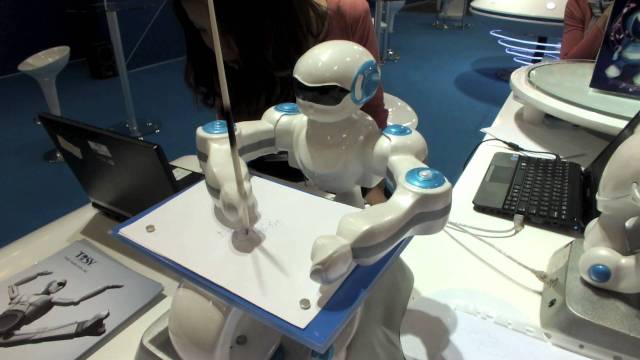A Tosy Robot at work (Photo: Harry Trung, SketRoboTOSY)

Jeremy Corbyn has become the latest politician to call for a tax on robots (these personal attacks on the Prime Minister really have to stop). Assuming that robots replace human workers, the logic for a robot tax appears straightforward. This is how John Bull puts the case (before demolishing it) in a post for the ICAEW’s Economia blog:
“…job losses will be followed by declines in income tax, social security contributions and other payroll taxes. Exchequers will see healthy tax flows replaced by increased obligations to pay social benefits. So far, so simple: why not tax a robot as if it was a person?”
The obvious retort is that robots aren’t people, they’re equipment:
“Neither robots (no matter how humanoid they might look) nor the AI which drives sophisticated machinery, highly evolved service-delivery mechanisms or financial transactions are anything other than tools by which businesses operate. They exist to boost business productivity and profitability. Taxing them as if they’re real people simply doesn’t make sense.”
Indeed, it makes no more sense to tax a robot then it does to tax a forklift truck, a combine harvester or a Corby trouser press. Each of those three items is a labour saving device, enabling what was previously the work of several people to be done by one person. A robot is no different.
But what if the new wave of automation is so powerful that instead of boosting our productivity, or freeing us up to do other work, we’re swept out of the labour market altogether?
I doubt whether this will happen anytime soon, but let’s assume it does. What would then happen to the tax base? Nothing good, says John Bull:
“In most G20 nations, the rate of tax which businesses pay on their profits (corporation tax in the UK) is less than the rate of income tax, social security contributions and payroll taxes paid by and in respect of the human workforce. So, increases in corporate profits promised by the rise of robotics will not result in a compensating increase in corporation tax receipts.”
He goes on to set out three options for a government response:
- “Increase the rate of corporation tax to compensate for the decline in labour taxes…”
- “Reduce the tax incentives available for research and development. While that might contribute to the solution, it could be disastrous for advanced economies.”
- “Or, broaden the tax base in other ways, for example through the implementation of a land value tax, through higher business rates for companies using robotics or AI, or through similar measures specific to business type or location.”
As it happens, there’s something rather fundamental that both Mr Corbyn and Mr Bull have overlooked: In the event of a comprehensive robot takeover of the labour market, tax rises will not be necessary. Indeed, we’d be able to abolish taxes on productive economic activity.
Instead, government could simply create money to fill its own coffers and to distribute to the population, making up for lost wages. In normal circumstances that would unleash inflation, perhaps hyperinflation. But there’d be nothing normal about an economy in which most work was done by robots and artificially intelligent systems. In such a scenario the supply-side would be able to ramp-up production to cope with any surge in consumption.
Indeed, the big challenge would be on the demand-side. The end of the payroll wouldn’t just demolish the tax base, it would pauperise consumers. Government would have to step in to create demand in the economy.
To an extent, it is already doing so–for instance, by holding down interest rates and through quantitative easing. Some economists want central banks to go further, using so-called helicopter money to put spending power directly in consumers’ pockets.
If such measures are on the agenda in today’s high-employment economies, imagine what would happen if super-productive machines were doing our jobs.
As I’ve argued before, we are moving into an era of new economic realities, in which old assumptions no longer apply. But just as we stand on the threshold of a fundamentally different future, our politicians are refighting the ideological battles of the 1970s.
Lucky old robots: they don’t feel despair.










Join the discussion
Join like minded readers that support our journalism by becoming a paid subscriber
To join the discussion in the comments, become a paid subscriber.
Join like minded readers that support our journalism, read unlimited articles and enjoy other subscriber-only benefits.
Subscribe